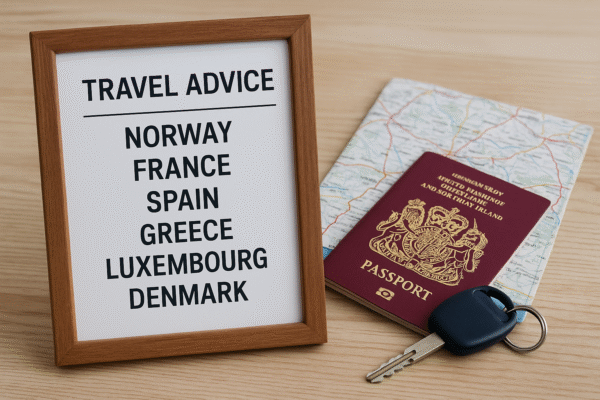The UK Foreign, Commonwealth & Development Office (FCDO) has recently broadened its travel advisory to cover Norway, alongside popular European destinations including France, Greece, Luxembourg, Spain, and Denmark. Rising safety concerns, new entry protocols, and evolving driving regulations are at the heart of this update, aimed at helping UK nationals stay safe and well-informed as they travel abroad.
Why the Update Matters
Travel conditions across Europe are changing, with increased risks from various sources—wildfires, terrorist threats, and regional demonstrations among them. To ensure travellers are properly prepared, the FCDO has updated guidance covering everything from travel insurance and passport requirements to upcoming systems like the Schengen Entry/Exit System (EES), set to begin in October 2025.
Norway: Fresh Guidance for UK Travellers
Travel Insurance: Strongly recommended to cover medical costs, cancellations, and unplanned events.
Safety and Security: Although Norway has relatively low security risks, vigilance in crowded areas remains crucial. Protests—especially in cities like Oslo, Bergen, and Stavanger—can disrupt travel. Petty theft at transit points is uncommon—but possible.
Driving Rules: Suppose you’re visiting during winter: winter tyres are mandatory when roads are snowy or icy (minimum 3 mm tread for cars, 5 mm for trucks). Drink-drive limits are very strict and enforced rigorously. UK photocard licences are valid for up to 90 days; paper licences require an International Driving Permit (IDP). Headlights must be on at all times, and at unprioritized intersections, you must give way to traffic from the right.
Entry Rules: Your passport must be issued within the last 10 years and remain valid for at least 3 months beyond your planned exit. UK nationals enjoy visa-free travel for up to 90 days within any 180-day period—but be mindful of total Schengen-day limits. From October 2025, EES will introduce biometric scanning (fingerprint and photo) at borders, potentially increasing processing times.
Remote Regions: Travellers to Svalbard or other Arctic areas should prepare carefully for limited emergency support and unpredictable weather.
France: Popular, but Stay Alert
France attracts millions of visitors annually, and with that comes some heightened safety concerns.
Travel Insurance: Must include cancellation, luggage, activities, and medical coverage.
Security: Locations like Paris, Nice, and Lyon remain potential targets for terrorism—vigilance in crowded spots is advised.
Crime: Petty theft is common in transport hubs and tourist zones—keep valuables secure and inconspicuous.
Entry Essentials: Align with standard Schengen passport rules—issued within 10 years, valid for 3 months past planned departure. Visa-free stays of up to 90 days apply, provided total time in Schengen remains within limits. From October 2025, prepare for biometric screening and longer border wait times.
Greece: Wildfires and Entry Updates
Greece remains a summer favourite but carries risks such as wildfires, particularly between April and October.
Wildfire Safety: Stay alert to local warnings, heed evacuation orders, and avoid affected regions like Peloponnese and Crete.
Insurance: Include coverage for evacuations and natural disasters.
Security: While terrorism risk is low, remain cautious in busy public areas and when using public transport.
Entry Rules: Same as other Schengen nations—passport validity, 90-day limit, and from October 2025, EES terms apply.
Luxembourg: Small Nation, Big Attention
Luxembourg remains peaceful and compact but is also part of these sweeping updates.
Insurance: Suitable for all planned activities and emergencies.
Entry Requirements: Follow Schengen passport validity and 90-day visa-free rules. EES implementation from October 2025 also applies here.
Spain: Sun, Scenery—and Wildfire Watch
Spain’s stunning coasts come with wildfire threats, especially in late spring through autumn.
Wildfire Danger: High in Catalonia, Valencia, and the Canary Islands. Stay informed of fire alerts and evacuation plans.
Insurance: Must cover wildfire-related disruptions.
Entry Rules: Same as Schengen: passport validity, visa-free limit, and the upcoming EES protocols.
Denmark (Including Greenland & Faroe Islands)
Whether heading to Copenhagen or venturing into Greenland or the Faroes, updated guidance applies.
Insurance: Must cover travel to remote locations and exceptional activities like wildlife tours or hiking.
Passport & Visa Rules: Mirror the rest of Schengen—valid passport, 90 days in 180, and EES from October 2025.
Travel Smart: Key Takeaways
- Check Travel Insurance thoroughly—ensure it covers medical emergencies, cancellations, and natural hazards.
- Verify Passport Validity meets Schengen criteria: issued within 10 years, valid for 3 months plus departure.
- Understand Stay Limits—90 days max in any Schengen 180-day window.
- Prepare for EES (from Oct 2025): Expect biometric checks and slightly longer border lines.
- Stay Alert—keep safe in crowded spots, monitor local risks like wildfires or demonstrations, and adapt accordingly.
- Plan Road Trips Carefully—especially in Norway’s winter or exploring Denmark’s territories.
By staying informed about entry regulations, safety advisories, and emerging systems like Schengen EES, UK travellers can enjoy carefree adventures across Europe. Advance preparation, vigilance, and adherence to guidelines remain your best tools for safe, enjoyable travel.
For more travel news like this, keep reading Global Travel Wire















